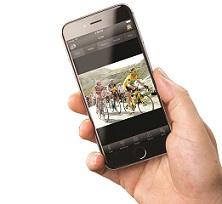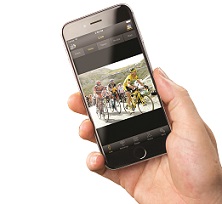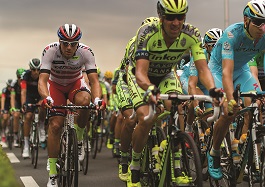

A robust mobile app featuring integrated event registration, customizable team or competitor schedules, live news feeds, instant notifications, travel and local area resources, live action video and real-time results creates a highly engaging event experience that extends the event beyond its physical space and time frame.
Some of the largest sports events in the world, including the Tour De France, the Super Bowl™ and Wimbledon, offer “official” apps that provide standings, results and real-time information about the competition. The Tour De France app puts the route map in the fans’ pocket by displaying race course maps showing live positions of cyclists on the road during competition.
The NFL, in conjunction with Verizon, introduced the Super Bowl™ Stadium App for the Big Game in February 2015 that enhanced ticketholders’ experiences with in-stadium video content including the Super Bowl commercials, replays from multiple camera angles, stadium seating and concession maps, and instant game day notifications; a separate Commemorative app extends the experience after the game by featuring NFL.com video, Super Bowl™ history, features on the competing teams’ journeys to the Big Game, and other bonus features.
Smaller local and regional events are also deploying mobile apps. Sports At The Beach, a CABA (Continental Amateur Baseball Association) affiliated youth baseball tournament facility in Georgetown, Delaware, partners with HiCast Sports to provide live video feeds from all 16 of the complex’s diamonds, viewable via a free app available through iTunes. Video clips can be downloaded and saved by users.
For racing events, whether human, machine, or animal, a mobile app can offer an enhanced experience for fans who may only see a short glimpse of the action up-close, at any one point on the course. ItsYourRace, a race management platform for human races, offers a mobile app that integrates with event registration and links participants’ profiles with their social media accounts. After the race, the app provides each participant with a personalized, printable Finisher Certificate showing the competitor’s place, time and pace, and offers race photo downloads.
Also specialized for race events, the MYLAPS Event Manager mobile app integrates MYLAPS automated race timing systems with a mobile event app for synchronized event registration, personalized athlete training plans, and participant tools including live tracking for fans via real-time, GPS-based tracking of racer positions, predicted finish times, a live leaderboard, and social media integration.
In addition to delivering an enhanced experience for event participants, there are also economic and social benefits in deploying a mobile app for your event. Registration and verification done in-app saves on printing, mailing and postage costs and promotes “green” event management by making paper information obsolete. Sponsorship funding for the mobile app can drive event revenue and further cement relationships with sponsors, not to mention the broad exposure they are provided. By integrating e-commerce via a store in the app or a link through to a mobile-friendly web based store, significant merchandising opportunities can be leveraged among the app users that represent a captive buying audience.
So, what’s new with mobile event apps for sports competitions, and how are sports destinations using apps to enhance, engage, extend and excite, as well as analyze and make improvements for future events?
Shorter App Development Cycles and the Cloud
With the rapidly growing demand for customized event apps, developers are accelerating the pace at which apps are created, reducing the timeframe between ideation and app launch.
While mobile apps date back to the end of the twentieth century as proprietary software (think small arcade games, ring tone editors, and calculators provided by the phone manufacturer), operating systems for today’s smart phones are open to the development of third-party software. In 2015, the number of active apps available in the App Store on iTunes tops 1.7 million (of which 73% are free to download.)
The number of app developers has grown as well, and specialization among developers is taking place. Typical app development timelines that used to be four to six months are now compressed to two to three months from start to finish; some apps may require more time, while others may be able to be pushed through the process a little faster, depending on complexity.
Developers are also taking advantage of cloud technology to integrate and sync apps on multiple devices and customizing apps for wearable devices, a growing platform thanks to the Apple Watch.

Why not feature a competition, within the competition? “Gamification” is the use of typical elements of game playing, such as rules of play, point scoring, and competition against others in new contexts. Unlike simple gaming, the goal of which is to add interest or have fun, gamification has a purpose: to motivate participation, engagement and even loyalty, and amplify the impact of the experience through techniques based on the fundamentals of human motivation. Without getting too deep into the psychology and science behind gamification, the basic idea is to engage event participants more deeply and keep them engaged for longer.
Some examples from the sports world include NFL Fan Rewards, a gamification program that awards regular users of the NFL.com website “coins” for consuming content, sharing, and participating in various activities online. Rewards include NFL merchandise and discount codes. The MLB Gameday app introduced a few years ago includes game mechanics where fans can win badges and trophies for witnessing and sharing in-game events, a great way to engage fans both at the ballpark and those watching from elsewhere. Smaller events can use this technology, proportionate to their fan base.
Beacon Technology
Beacons are small, smart objects placed at various points in a venue that send out Bluetooth signals which are detected by smart devices. Using beacon technology, a venue can offer app features that are exclusive to those attending in person, but not available to spectators outside of Bluetooth range. How are they used? A spectator who enters an event venue can be sent a welcome notification; those waiting in the food concession area can be sent special offers, menus for pre-selection or the location of other concession areas if wait-in-line time exceeds a certain limit. Fans entering the merchandising areas can be sent coupons and special offers for souvenirs and other items available for sale.
For fans taking in a game at an MLB ballpark, for example, the MLB.com Ballpark App uses beacon technology to complement and personalize a trip to the ballgame with mobile check-in, social media integration, special offers, rewards and exclusive content; some MLB ballpark venues also offer mobile food and merchandise ordering, seat upgrades, and interactive concourse maps. Other features include personalized history for ballparks that have been visited by the user, and ballpark and player entrance music information (with the ability to purchase songs).
Aside from “personalizing” the experience for fans and spectators, beacon technology also provides valuable data collection for event organizers including head count, traffic flow patterns, and user preferences. This data can be analyzed and used to drive decisions for future events.
App and Data Security
According to a 2014 report by Gartner, Inc., an IT research and advisory company, 75% of mobile applications will fail basic security tests in 2015. The hackers will continue to exploit security gaps in mobile applications to crack sensitive information; security remains a big challenge on mobile devices and mobile app security is something developers are working to improve.
Sports destinations and events competing for participation and spectators should evaluate the benefits of developing a mobile app for both valuable data collection and analytics, as well as to enhance the event experience and more deeply engage its competitors and fans.

